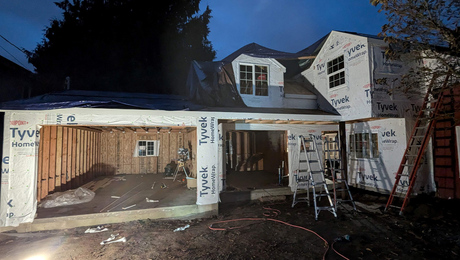*
I have the Set 99 article by red Lugano Fixes for Damp, Moldy Houses.’ However I can purchase a Wisconsin lake-side cottage that currently doesn’t appear to have any of the mentioned probable causes. In fact, the structure doesn’t show signs of mold or water damage, but the furniture has mold. My wife won’t let me make the purchase (she can smell’ the mold, I can’t) and feels if there’s visible mold on the furniture, there’s bound to be mold hidden in the house. The cottage is heavily shaded, lake-side and has been lived in year round (no air conditioning. I blame the mold on damp, lake-side humidity. I figure another Lugano-perscribed check just to make sure, a thorough cleaning, and a dehumidifier would solve the problem. She says once there’s mold, its always going to have a mold smell.’ Who’s right? Once the water problem is solved, how do you get rid of mold smell?
Discussion Forum
Discussion Forum
Up Next
Video Shorts
Featured Story

The FHB Podcast crew takes a closer look at an interesting roof.
Highlights
"I have learned so much thanks to the searchable articles on the FHB website. I can confidently say that I expect to be a life-long subscriber." - M.K.














Replies
*
If.... and I stress the IF... mold is indeed in the wall cavities, the only way to properly remove the mold is to open the walls and remove the mold infected materials. Most times, if the mold is mild, and can be seen, it can be treated/killed with a bleach/water solution. This usually happens in attics where the mold is visible, on ceilings or walls where the mold is visible on the room side of the surface, and on exterior siding/trim.
Mold in homes has become somewhat of a problem nationwide. Some molds are toxic, and can cause serious and permanent illnesses. Some molds are harmless, and only smell kinda bad. Either way, mold is one of the hardest things to get rid of. When eliminating the mold, you absolutely MUST eliminate the source of the moisture or you will be fighting a never ending battle.
I do not have the climate conditions that you live with. Maybe someone else here can best tell you about the use of room dehumidifiers in your region, and how effective they are. We use air conditioning systems here for that purpose, and live with high humidity percentages (80% or higher on average).
One more note... I wouldn't put a lot of faith in what you read in the article. Look for more info on the subject, and find out more facts before deciding whether or not to buy the place.
Just a thought...
James DuHamel
*Mold activity will cease if you always keep the humidity below 50% - yes this means air conditioning or dehumidifying.I can't say for smell.Assuming dry air - air circulation goes a long way to preventing it.-Rob
*I echo James' comment, don't put a lot of faith in the article.Mold can be dealt with in almost any home. The key question is at what cost? Even if it is in the walls and even if it is associated with structural damage it can be dealt with. It just costs time and money.So, the first question that has to be answered is how much mold there is and what kind is it? Find someone in the area, maybe an University, or Environmental Testing Lab, or Public Health; you will just have to go hunting. Get them to tell you what kind of mold it is and how toxic it is.Assuming you still want the place then start poking holes, looking in corners, taking off switch plates, etc to see how extensive it is.Then you know how big the problem is and you can decide if you want to deal with it.But...unless this is THE PLACE in THE LOCATION I wouldn't mess with it unless the price were very good. I'd go looking for another one.
*
I have the Set 99 article by red Lugano Fixes for Damp, Moldy Houses.' However I can purchase a Wisconsin lake-side cottage that currently doesn't appear to have any of the mentioned probable causes. In fact, the structure doesn't show signs of mold or water damage, but the furniture has mold. My wife won't let me make the purchase (she can smell' the mold, I can't) and feels if there's visible mold on the furniture, there's bound to be mold hidden in the house. The cottage is heavily shaded, lake-side and has been lived in year round (no air conditioning. I blame the mold on damp, lake-side humidity. I figure another Lugano-perscribed check just to make sure, a thorough cleaning, and a dehumidifier would solve the problem. She says once there's mold, its always going to have a mold smell.' Who's right? Once the water problem is solved, how do you get rid of mold smell?